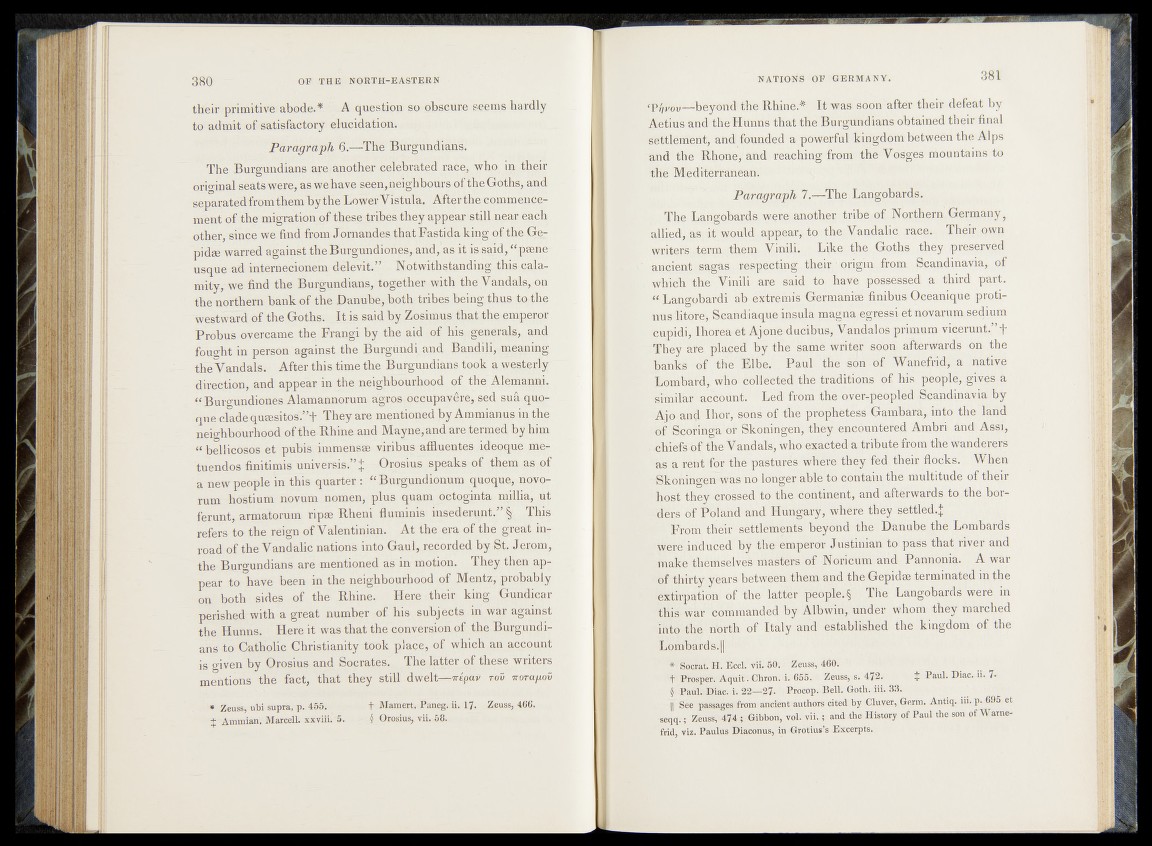
their primitive abode.* A quevstion so obscure seems hardly
to admit of satisfactory elucidation-.; |
Paragraph 6.—The Burgundians.
The Burgundians are another celebrated race, who in their
original s ^ ts were, as we have seen, neighbours of the Goths, and
separated from them by the Lower Vistula. After the commencement
of the migration of these tribes they appear still pear each
other, since we find from Jomandes thatFastida king o£the Gej
pidae warred against theBurgundiohes, and, as it is said, ‘tpaene
usque ad internecionem delevit.” Notwithstanding, this calamity,
we find the Burgundians, together with the Vandals, on
the northern bank of the Danube, both tribes being thus ,to thp
"Westward of the Goths. It is said by Zosimus. that th|^rai^e|;^r
Probus overcame the Frangi by the aid of his,?generals,, and
f o ^ i t in person against the Burgundi^and B a n ( |jJ i/^ ^ iq g
the Vandals. After this time the Burgundians took a h B B
direction, and appear in the neighbourhood, of the Alemanryi.
“ Buvgundiones Alamannorum agros o ccupay^^m^s|}fisquoque
cladequaesitos^t They.are..mentioned by A m p i^q u ii^ g p ,
neighbourhood of the Rhine and Mayne,aud are termed, by lim^
« bellicosos et pubis immensse viribus affluentes idcoque (ine-
tuendos finitimis universis.” J Orosius speaks of them .a |^ f
a new people in this quarter : “ Burgundionum quoque, novo-
rum hostium hnyum_nomen, plus quam octoginta ■»Hliai ujt
ferunt, armatorum ripae Rheni fluminis insederqnt.f | This
refers to the reign of Valentinian. At the era of the »great fhr
road of the VandaKc nations into Gau ^recorded by
the Burgundians are mentioned as in motion. They,then appear
to have been in the neighbourhood of Mentz, probably
op, both sides of the Rhine. Here their king Gundicar
perished with a great number of his subjects in war against
the Hunns. Here it was that the conversion of the Burgundians
to Catholic Christianity took place, of which an account
is given by Qrosius and Socrates. The latter .of these writers
mentions the fact, that they still dwelt—iripaff rov Torapov
* Zeuss, Tibi supra, p. 455.
+ Ammian. Marcell. xxviii.'5.
f Mamert, Paneg» ii. 17* Zeuss, 466.
^ Orosius, vii. 58»
‘Prfvov:—beyond“ the Rhine.* I t was sq'on after their defeat by
Aetius and the Hunns that the Burgutodians obtained their final
éëtlleïherit; and founded a- powerfühkingdom between the Alps
and the'^Mhotfe,- and, feacliing from the Vosges mountains to
the Mediterranean.
Paragraph 7.-^-The Langobard
The L a n g q b ^ ^Y ^ ^ # !1^ 6®'1' ^ of Northern Germany,
\&lfcp,d>$s, it ,racp^ /,Tj|pir own
writers! ^ ir.m ^ th em ^ inili • L ^ k ^ tU ^ o f h s . {tjiey „preserved
ancient vsag^s,' from, Scapdinavia, of
which the1 Vinili are saidj^&> have/possessed; a third part.
“ Langobardi" ab.extremïsfG^rmaniae fini|us)^c(eanique proti-
nus litoii^ S cahdi aque insula .np.ag.na p > et novarum ^ j u m
feipidi, Ihorteefc Ajone duoffius|VandaflmWi^^rn yjcerunt.’’ t
^T i% ' are placed by the ’ same write^ spou^afterWards -mi the
ftfe ik $ ' o f the Elêè: Paul Wanefiiid,' .a native
t r a d i t i ^
s f f e la if a ö lb w ^ Led fefcn t h c ^ « ^ p ^ W B ? a ^ \n ^ a
Ajo.arid Ihor,-sons of t f l / p r ^ É f f l ’s ë'ambarh, in tq ^ S la n d
tli'^^'^t-öiftilert*^i 4 ||b r i and Assi,
'Acfefibf the Vandals' whb eiahtèd^jtribulelrorh tlëV an d je ^ s
a rent fc?F the p a stu fls^ h e r^ tlm ?W - tl lèi^WCks. j When
y^Ékoningenwas' no lon%r a ® ^ | cont^th(#|tnultitudheof their
h ! ö s l ' f i # 4 ^ f .to th®>Sirient, and aftërWarids to.the borders
of Poland and Hurig^fy, whëfe # e y ^èttléd.J
From their;settlements^ bey ond' tbef Danube the Lombard's
w&iyere iridu^ed by the* ©inperor J \i'S^tonian'to. pj^s^hsöt river,and
make thémlelves mastlrs of ||@*ieurn amll^ P a ^ b h ia . A war
i,bf thirty yêarsbétw een/1 hern and the' G~e^i d-th^to r tp i n a t ed-'i n the
extirp'iëdh’ ‘of H ' i The^Langebards were in
this war commandé®y Alb win, »mn<fer whom they- marched
intd'the/ nbrth of Italy and established th e . kin|$om;'of the
| Lomba rd|%ff^h
* Socrat. 33. Èccl.Hl‘£ 50; Zeuss,- 46(1. ■
Prospers ChroW(tii'65^.<^ ZeusSj-s^ 472;' $ PauL»Diactii. 7«
't'l ■ $ Paiilw Biae; i. 22—27- Procop. Belt. Gotli. iii. 33.. •
passages from an'cifent'a,uthoïS' citedfb.y:-~Glu^er, Germ. Antiq.iii.fP- 6.95 et
*eqq. ; Zeuss,'474 ^GibiXni, vol.iyM'^ and thé.History of Paul the son pf Warne-
i * frid, viz. Paulus Diaconus, in Grotius's Excerpts.